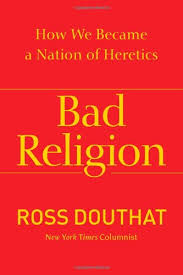Further research and information on the English Reformation, English Catholic martyrs, and related topics by the author of SUPREMACY AND SURVIVAL: HOW CATHOLICS ENDURED THE ENGLISH REFORMATION
Wednesday, March 12, 2014
"Bad Religion" and "Dangers to the Faith": Book Review, Part Two
I read Ross Douthat's Bad Religion: How We Became a Nation of Heretics last month and then followed it up by reading Al Kresta's Dangers to the Faith: Recognizing Catholicism's 21st-Century Opponents. The two books are related, as both authors examine the Church's competition for what to believe, how to pray, how to live, and how to think. Douthat tells a story, tracing a history of change and secularization and focusing on a handful of heresies--teachings about Christianity that over-emphasize one doctrine or another and thus distort Christian orthodoxy (using a Mere Christianity view). Kresta writes about 14 opponents of the Catholic Church divided into four groups: Abusers of Spirituality and Revelation; Abusers of Science and Reason; Abusers of the Past and Future, and Abusers of Wealth and Power. Douthat's book is a narrative to be absorbed and analyzed, with a conclusion that emphasizes personal action; Kresta's is is a compendium of information to be consulted and used as a reference for refutation and argument. As I reviewed Bad Religion yesterday, today I focus on Dangers to the Faith.
To begin, I think I should note that Al Kresta has interviewed me a few times on his radio program; he and Nick Thomm even reached out to me to set up an interview on site at the Catholic Writers Guild Conference. Nevertheless, neither he nor OSV sent me a review copy or asked for my opinion. I bought my copies of both Bad Religion and Dangers to the Faith at Eighth Day Books. I have also listened to Al Kresta's program often and was more familiar with his way of reasoning and presenting his arguments than I was with Douthat's--in fact, although I've heard of Douthat and seen and heard interviews on broadcast media, this was the first work of his I'd read. Reading Dangers to the Faith is like listening to Al Kresta: his story-telling method; his way of presenting his side of the argument and deflating the other side's argument--they come through clearly here. His voice is unmistakable on the printed page.
As Kresta presents the 14 dangers to the Faith, he quotes extensively from the sources of the dangers' founders and exponents. Each chapter is dedicated to a specific danger, outlining its tenets and contradiction of Catholic Truth, and then describing arguments against it. The book does not have an index, but it does have pages of notes so you have the sources and resources for further reading. I saw Mr. Kresta on Raymond Arroyo's The World Over program and he commented that these 14 dangers are all abusers of goods. They take something good, like understanding nature through the scientific method, and twist it so that the scientific method becomes the only way to understand life. In that way, these abusers of goods resemble Christian heretics, who take some aspect of the truth, for example, Christian teaching on Who Jesus is and over emphasize it like the Arians or the Monophysites. In a way, both Kresta's "abusers of goods" and Douthat's "heretics" are narrow minded and limited: they cannot see the complexity of reality and so try to manage it by bringing reality down to their level. It may be difficult to understand the relationship between Faith and Reason or how Jesus could be True God and True Man, but it's better to try and fail than to adopt an unrealistic minimalization of the truth so you can handle either truth.
In addition to commenting on the voice so evident in these chapters, I'd like to mention the tone: Kresta is always charitable, sometimes a little exasperated, but never demeaning or disparaging. He speaks of these "enemies" with love, because he wishes they knew the truth. Using the example of Oprah Winfrey's encounter with the Dominican Sisters of Mary, Kresta demonstrates how much she knew something great and good was there--she just didn't recognize Who was there.
Kresta achieves his goals in helping his readers "know and love the faith" and "love the mission field" (from the Introduction). I did find the subheads, used not just for sections but for paragraphs, rather distracting, and I do wish the book had an index. Dangers to the Faith is an excellent resource and reference. Kresta ends his book just as Douthat did: with a call to sanctity for all Catholics as the best apologetic argument we can make.
Subscribe to:
Post Comments (Atom)


No comments:
Post a Comment